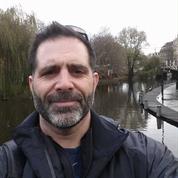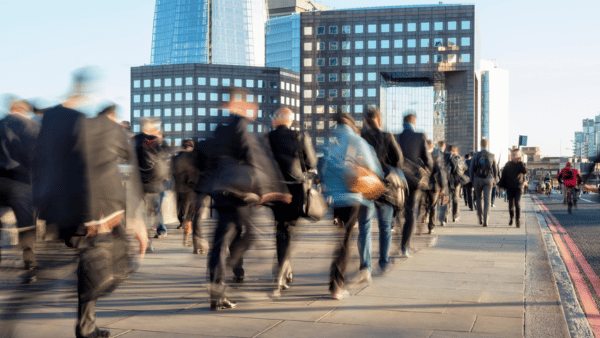Chris Oestereich FRSA describes how the Circular Design Lab got started and how it plans to tackle Bangkok's biggest challenges.
Humanity is faced with a number of daunting challenges. Problems like climate change are continually growing. If we look at them as a whole, it's easy to get overwhelmed; to feel like any action we take would be insignificant in terms of the scope of the challenge. But what if you could foster meaningful change with community members working together to lead the way? That's a challenge I set out trying to answer with a small group of action-oriented colleagues.
It started with a question, “How could we foster a community that could help address some of Bangkok's biggest challenges?” The five of us met as lecturers at Thammasat University's School of Global Studies (SGS), decided to create an experiment to try to make this happen. The team, including Alix Fontaine Watson, an SGS faculty member, Courtney Savie Lawrence with the UNDP Regional Innovation Centre, Jett Virangkabutra and Praewa Satutum with Thailand's Government Innovation Lab, and I started the project via hallway conversations. These tended to center on open-ended questions like the following:
- How could we foster the sorts of impacts we’re seeking, but at a much larger scale than we are now?
- How might we leverage the skills within our group to make that happen?
- How could we marry design principles with systems thinking in a way that's accessible to a broad audience?
- How could we instill the confidence in others to test possibilities with their spheres?
- How could we design a program that was intentionally inclusive and open?
Conversations like this bubbled up throughout 2018 as we looked for a path forward.
Late in the year, we decided to try to develop a framework for circular design, that would explicitly bring systems thinking into the mix. We also decided to make it an open, inclusive process that would make the participants the change agents. We would share what we created openly, and we would hold public workshops to teach others how to design such systemic changes. The goal of doing so was to help them gain confidence in using the process on their own, as well as to teach it to others. With that, the idea of the Circular Design Lab was born.
For the past several months, the team has been meeting to develop our ideas. We started with our values and first principles, sharing our individual motivations for wanting to see this project come to life. Themes like wanting to enable others to feel empowered to deliver change, as well as having a desire to craft a better future for our communities emerged from that process.
We then discussed our values and redlines. This gave us a better understanding of where we stood both individually and collectively. Our small group included members from three continents, so we brought very different backgrounds, experiences, and perspectives to the table. This diversity offered great possibilities as we worked to develop our program, but it also might have been a source of misunderstanding and other challenges. Discussing our values seemed to help us along these lines as we gained a better understanding of each other's motivations, as well as the sorts of things each of us might be demotivated or upset by.
Next, we started developing our program. Praewa took the lead in this as she looked to create a framework that offered a replicable approach that offered significant flexibility. The team has deep experience facilitating design workshops, with Human-Centered Design being a common model we've all used. We discussed that model as a starting point. What were its strengths, and where were there opportunities to rethink the process for our specific aims? We arrived at a central aim of shifting from being human-centered, wherein solutions are designed for specific groups of people, to being participant led, wherein humans who want and need solutions, find answers for themselves.
Out of these discussions, we developed four primary sections for our framework. Those include:
- Co:Initiating Lab - Teams will form and begin to work together to share perspectives as they observe and select the challenge they will address in the workshop.
- Co:Sensing Lab - Teams will be guided through a sensemaking journey that blends design and systems thinking processes alongside behavioral insights. Teams will push to gain a deep understanding of the challenge they selected from as many perspectives as possible.
- Co:Creation Lab - Here we’ll work to test and refine ideas through experiments in an open-ended session. Teams will have the option to select from a range of tools and processes as they work towards their solutions. This section will be followed by a public event on the evening of May 22 in which the teams will present their in-progress ideas. They’ll then have the chance to interact with an engaged audience in an idea salon in service of further refining their ideas.
- Co:Synthesis Lab - In the last stop in our journey, teams will share the story of the system as they've re-conceived it. We'll then cross-pollinate ideas between groups and teams will reflect and adapt their ideas using the feedback they receive.

From Words to Action
Over the last few weeks, all this talk has shifted towards action. On March 5, our team co-hosted a showing of Closing the Loop, the first full-length documentary on the circular economy as part of the Circular Economy Club’s global showing. And on March 13, we held a panel on circular design as part of the Bangkok Talks speaker series. That panel was followed by breakout discussions on opportunities and challenges with waste in Bangkok and beyond. The evening’s panel shared their experiences in looking to warm the crowd up for our workshop lead-in exercise.

Next up we have our first big dance. For this, we scheduled four Saturdays for workshops — one for each section of our framework — between now and May. The RSA Global team has generously provided a grant for this effort, which made it possible for us to run the workshops free of charge for our participants. We’re now getting people signed up for the events and finalizing our materials. On March 30, we’ll jump in and see where things lead.
When the workshop is over, we’ll share the ideas we come up with and hopefully, we’ll find ways to implement meaningful change. But the real goal, for now, is to build a community that will support each other going forward. We want to focus on learning together and finding ways to affect long-term change as we draw others into the effort. If we can manage to get going in that direction, the follow-on effects should be far greater than anything we might accomplish in a single workshop.
SIGN UP TO THE WORKSHOPS
Related articles
-
Counting the cost of bowling alone
Andy Haldane
In his 2025 CEO Lecture, Andy Haldane addresses how the ever-increasing cross-border flows of goods, people and information affect widening divisions and accelerate the depletion of social capital.
-
Prosperous Places: creating thriving communities
Tom Stratton
With regional growth at the top of the agenda, it is vital that we create thriving communities across economic, social and natural perspectives. Prosperous Places is a suite of interventions aimed at responding to the unique ambitions and challenges of places.
-
Pride interview: Felipe Tozzato
Deborah Ajia
The commercial photographer and RSA Fellow explains what Pride means to him, the importance of courage, making friends through rugby and why being gay is his superpower.




Be the first to write a comment
Comments
Please login to post a comment or reply
Don't have an account? Click here to register.